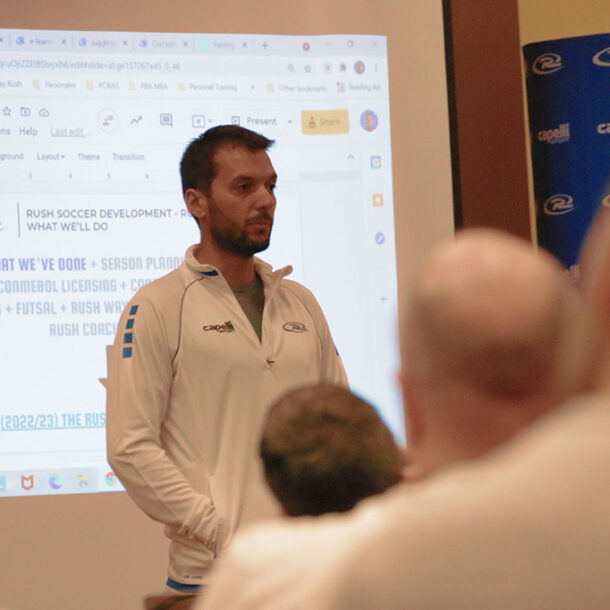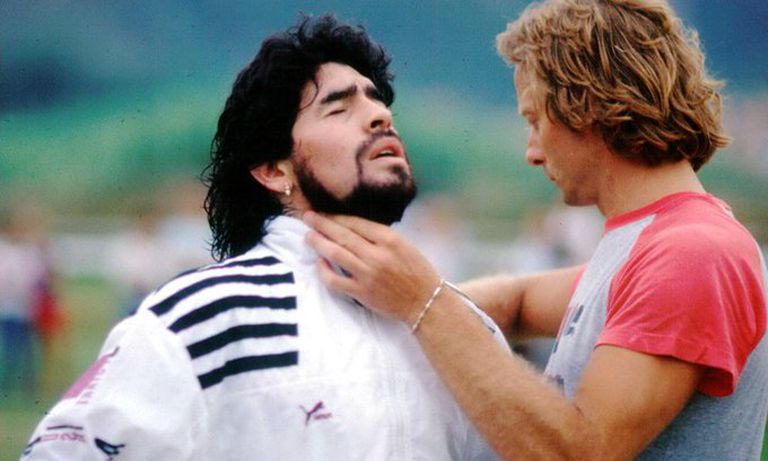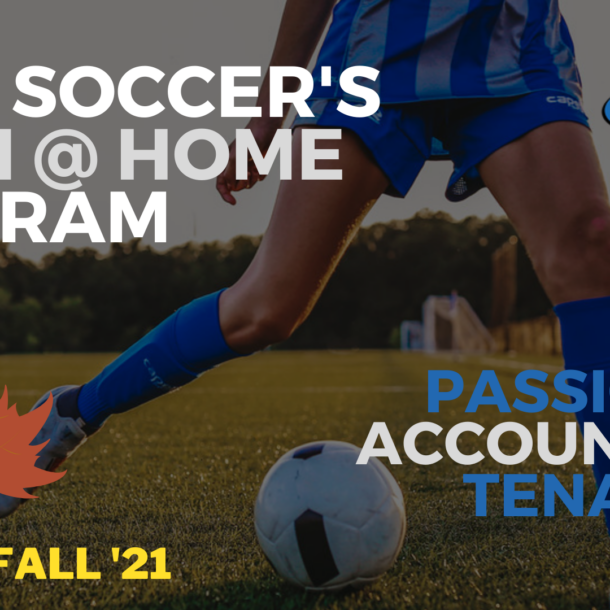
Last week, Pablo Toledo, Rush Soccer’s Sporting Project Director, was joined by Fernando ‘El Profe’ Signorini to discuss best practices to organize and execute your team’s pre-season. 90 minutes of gold dust. Check some highlights below.
That Fernando ‘El Profe’ Signorini is one of the most renowned conditioning coaches in the world and he is the only footballer’s trainer who has worked with Diego Maradona, Lionel Messi, and the only two Argentinian coaches that have won World Cup Titles: César Luis Menotti and Carlos Salvador Bilardo, all of that is probably no surprise to you, but that he wouldn’t even define his duties as such might be something you haven’t heard before.
THE ROLE OF THE CONDITIONING COACH
FS – “I say that I’m not a conditioning coach because that’s a term derived from athleticism a long time ago, and they were called that way because the major concern of an athlete is the physical aspect. In football, the player does not have a lane where he or she only needs to run forward. I’ve never seen an athletic discipline in which you run forward, backward, to the sides, you turn, you jump, and you do all of this while thinking where to pass or how to protect the ball or how to play through or where to stand to receive, so the problem for a footballer is a lot more complex, starting by the fact that their emotional state has a deep impact on their performance. Imagine being on the mind of someone that knows that if he or she doesn’t play well tomorrow he/she is probably out of the roster and possibly jobless next season. That’s why I say that football is a cultural phenomenon with roots in the popular classes and that people can think of you as a god for a moment and two minutes later stare at you with contempt. I don’t feel like a conditioning coach because that’s reducing the duty and we need to move forward. Within a coaching squad, honestly speaking, I think the conditioning coach is the least important member”
PT – I think this that you’re saying is huge because it also sets the basics to understand the sport. Football is not an athletic discipline, because athletic disciplines are cyclic and football is not, and moreover, there’s a cognitive element that’s always present in football. Like you teach at the Menotti Coaching School, “in athletic disciplines when you reach the line you finish, in football when you receive the ball you start again”.
FS – Absolutely, Mourinho said it too: “In football, anything that you train without the cognitive element present is nonsense”. If everything is linear and you run from A to B to H and back, that might be useful for other disciplines but not for football. Football is capable of getting to their knees any theories that might be valid for other sports.
FOOTBALL COMES FIRST
FS – Somebody in this role needs to know about conditioning, but firstly, he needs to know about football. Football is so generous that is the only sporting discipline in which you can do everything wrong and still win the game. It is so strange that a natural born goal scorer like Martin Palermo can miss three penalties in the same match and then score a goal with a header from midfield.
KNOW THEM, CARE, AND LISTEN
FS – I’m absolutely sure that what I did with Diego anybody else with minimal knowledge could have done it too. What was different was our relationship, which was wonderful. I know that if I had trained another athlete maybe nobody would have ever known me, because I never assisted Diego or dribbled for him. I always listened to him, maybe that was the best thing I did, asking him what he felt he was needing the most. Why? Because to help somebody you first need to get to know him, it’s a lot easier to help somebody that we know well.
Listen to the Podcast:
ABOUT PRESEASON AND TRAINING THE INDIVIDUALITY ON A GROUP SETTING
PT – Fer, a lot of our clubs are starting season now so many coaches ask about the pre-season period, what to do in this first month. What are your thoughts and recommendations?
FS – Before I met Cesar Luis Menotti, that I consider my mentor, I used to think just like everybody else. I would repeat what I had read or what I had been told or what I had experienced as a player from my coaches. If I knew that the opponent’s conditioning coach had his players run 5 miles, I’d have mine run 6. Everything was a matter of quantity. Then I traveled to Europe and started watching Barcelona’s training when Cesar Luis was the head coach. It was completely different. Everything with the ball moving from 1v1 to any numbers or situations. I kept thinking ‘and where’s the conditioning portion?’ and the conditioning portion was right there. The players had a target in the ball but were running like animals. When you’re on pre-season, the main objective is to settle the game model that the head coach chooses. Running and jumping it’s included, but the fundamental aspect is the ‘idea’ that we are going to train. The first activity that you run in pre-season should be, as a symbol, with the ball.
PT – You know in the context that most of the attendees work, that is coaching youth, I think this is even more important. When we talk about a player that’s 15, 16, 17 years old, what matters most is that he learns to play football better. I remember you and Ruben Rossi telling me once that ‘we can make anybody run a bit more or get a bit stronger, the challenge is to make them read a situation, decide to switch sides, and execute a 40 yards pass accurately” so we should remember that in terms of prioritizing topics in our sessions because we only get a couple of hours a week with the players.
PT – I think we all fully agree with you that we need to base ourselves on the game model and the overall development plan for the player. Now, if we were trying to tailor training a bit towards developing a specific physical valency, how could we do that?

FS – I think in football it is more relevant to train speed and strength endurance than speed and strength as fundamental valencies. Why? Because I could have Usain Bolt, the fastest man alive, on my team, but if he gets tired after three sprints it is not really that useful, I would prefer one that’s not as fast but can sustain the effort 30 times. The same happens when we talk about strength. And we need to remember that every player is unique and going through a unique circumstance, so the emotional and cognitive elements are always connected. That’s why I think the best and only way to train is through sensations and not time. It’s the only way to train based on the individual capacity in a group setting.
PT – I’ve seen you do that and I think it is fascinating. Would you mind giving an example?
FS – Yes, so let’s imagine that right where they are on the field (always explaining the exercise and each command in advance) I tell the players to perform the following efforts always picturing game situations. Example: Five seconds of sprints, then five burpees like a diving header, then sit ups then four headers, etc, alternating, and as time passes by we increase the number of repetitions. The exercise follows, we don’t stop by fixed sets with a certain number of repetitions, so as the players get tired the body sends a message. When you reach your limit, stop, but that’s your limit, not the others, so they keep going. Moreover, you need to understand that it was your limit TODAY, because maybe tomorrow you slept better or worse or you ate differently and that limit changes. We do it like this because the player connects with his possibilities on that particular day, we respect the individuality even when working on a group setting.
PT – Where do you place that on a training session?
FS – You learn that with experience and always looking at what the head coach is doing, because you want to make sure you’re sending the players with fresh legs. At the beginning of the season you would start with simpler, lower demands, because it’s the most risky moment, and then you would start elevating the load, but again always remembering that the core is to practice the head coach playing idea. The one suggestion that I would make is to reduce loads to a minimum within the last 48 hours prior to a game, because there’s too little to win and too much to lose in that period. Also, I’d suggest to be careful with reaching limits, because a limit means there’s a maximum. Players need to be prepared rationally.
ABOUT TESTING
PT – Last one Fer. What do you think about testing? I see so many ‘bip’ tests like the ‘Yo-Yo’. Do you use any?
FS – None, absolutely none. Do you know what those tests are for? The substitutes trying to convince the coach that they’re better than the starting eleven running or lifting weights. Even the name sounds a bit ridiculous (in reference to the Yo-Yo Test).
THANK YOU FERNANDO!









